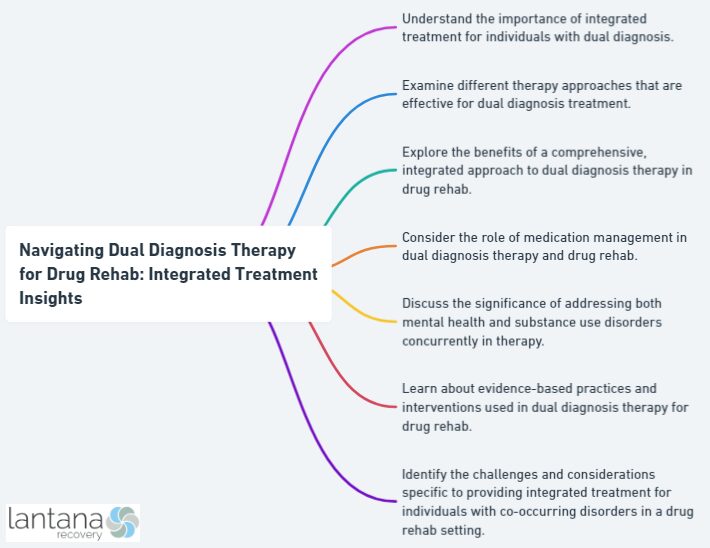Imagine trying to solve a puzzle without all the pieces. That’s what it’s like to treat only one aspect of a dual diagnosis without addressing the other. Dual diagnosis refers to the presence of both a substance use disorder and a co-occurring mental health condition. With over 9 million adults in the United States receiving treatment for mental health conditions and substance abuse disorders, the need for integrated treatment, such as dual diagnosis therapy for drug rehab, is more crucial than ever. In this blog post, we’ll explore the many facets of dual diagnosis therapy for drug rehab, from tailored treatment plans to holistic approaches, and learn how they work together to create a comprehensive and effective recovery plan.
Key Takeaways
- Integrated treatment is the gold standard for dual diagnosis, involving tailored therapy and a coordinated care approach.
- Cognitive-Behavioral Therapy (CBT) and Dialectical Behavior Therapy (DBT) are effective forms of psychotherapy in dual diagnosis treatment.
- Family therapy, aftercare planning, holistic approaches, medication management programs & insurance coverage help ensure long term success post rehab.
The Crucial Role of Integrated Treatment in Dual Diagnosis
For individuals grappling with co-occurring substance use disorders and mental health problems, integrated treatment serves as the gold standard of care. This comprehensive approach ensures that both the mental health and substance use issues are addressed simultaneously, leading to better recovery outcomes. Dual diagnosis treatment centers provide therapy as a primary tool to analyze the root causes of addiction and mental health issues, recognize triggers, and establish long-term plans for maintaining sobriety.
Overlooking one disorder when two coexist can escalate risks, such as overdose, suicide, and other legal and medical problems. With integrated treatment, all facets of a person’s mental health and addiction are tackled, minimizing these risks and providing a greater likelihood of achieving a substance-free life that is healthy and productive.
Tailoring Therapy to Individual Needs
The individual needs of those with a dual diagnosis are as unique as fingerprints. Personalized therapy plans are vital to address each person’s unique requirements. Formulation of an individualized therapy plan calls for the incorporation of evidence-based psychosocial treatments tailored to various illnesses and customizing them to the individual’s specific needs. This includes helping the patient gain skills and strategies to effectively manage both their mental health and substance use disorders.
Individualized therapy plans offer several advantages, including:
- Increased flexibility
- Enhanced efficacy
- Concurrent treatment
- Stronger social backing
- Adaptability
By taking into account key factors such as therapeutic relationships, listening and counseling skills, holistic approaches, and personalized treatment, a tailored therapy plan can provide the best possible care for those with a dual diagnosis.

Coordinated Care Approach
A coordinated care approach is necessary to handle the intricacies of dual diagnosis that ensures all aspects of a person’s mental health and substance use disorder are considered holistically. This approach involves:
- A multidisciplinary team of professionals
- Comprehensive assessments
- Integrated treatment
- Care coordination
- Medication management
- Behavioral therapy
- Support groups
- Case management
The challenges in executing a coordinated care approach in dual diagnosis treatment include:
- Complexity of diagnosis
- Need for integration of treatment
- Rigid models and approaches
- Unnavigable systems
- Provision of services across different sectors
Nevertheless, overcoming these challenges and embracing a coordinated approach is pivotal to achieving successful outcomes in dual diagnosis treatment.
Continuity of Care
Continuity of care serves as the bonding agent in dual diagnosis treatment, ensuring that progress is maintained and relapse is prevented. Strategies for ensuring continuity of care include:
- Proper identification, assessment, and diagnosis
- Integrated care approaches
- Harm reduction strategies
- Contingency management
- Relapse prevention
These strategies are all employed to guarantee continuity of care.
A consistent treatment team is instrumental in fostering continuity of care, as it allows patients to receive ongoing care throughout their treatment journey, creating a strong therapeutic relationship between them and their treatment providers. Support groups also play a significant role in dual diagnosis aftercare, providing a sense of community and ongoing support for those in recovery.
The Synergy of Behavioral Therapies in Dual Diagnosis

In dual diagnosis treatment, Cognitive-Behavioral Therapy (CBT) and Dialectical Behavior Therapy (DBT) emerge as two fundamental behavioral therapies, helping individuals develop effective coping skills and emotional regulation.
These therapies, when combined, can foster a potent synergy that improves treatment outcomes for those with co-occurring disorders.
Cognitive-Behavioral Therapy (CBT)
As a form of psychotherapy, CBT enables individuals to:
- Identify and alter maladaptive behavior and distorted thinking
- Transform negative thought processes and behaviors that may be contributing to their substance abuse and mental health issues
- Learn coping skills, problem-solving strategies, and relapse prevention techniques
- Address primary issues such as trauma and self-esteem
CBT is an effective therapy for dual diagnosis treatment, as it helps individuals in transforming negative thought processes and behaviors while addressing their substance abuse and mental health issues.
CBT can be employed in individual or group therapy settings to support individuals in their recovery journey. The advantages of CBT in dual diagnosis treatment include:
- Enhanced self-esteem
- Coping skill development
- Improved moods
- Improved brain functions
- Adaptability for various mental health conditions
- Improved functioning and quality of life
However, the time required and the reliance on full client engagement are potential limitations of CBT.
Dialectical Behavior Therapy (DBT)
DBT, a variety of psychotherapy, equips individuals with the tools to manage challenging emotions effectively and reduce conflict in relationships. Initially prescribed for the treatment of borderline personality disorder, DBT has been proven effective in treating dual diagnosis as well.
The initial step in DBT is to have the patient intentionally focus on being in the present, followed by teaching them to accept negative emotions rather than disregarding them. Individuals are then taught to regulate their emotions and strengthen their relationships in a respectful and assertive manner. By providing tools to manage emotions and improve interpersonal relationships, DBT supports recovery from co-occurring disorders.
Medication Management in Conjunction with Therapy

In dual diagnosis treatment, medication management can play a pivotal role, as it can assist in maintaining sobriety and managing mental health symptoms when used in tandem with therapy. Various medications for drug rehab commonly prescribed for dual diagnosis treatment include:
- Buprenorphine
- Methadone
- Naltrexone
- Antidepressants
- Antipsychotics
- Anticonvulsants
- Beta-blockers
Studies have shown that a mix of medication and therapy can successfully address drug or alcohol addiction. Medications can help manage withdrawal symptoms and cravings, while behavioral therapies, such as CBT, address the underlying psychological issues and help individuals develop coping skills and strategies for long-term recovery.
Integrated treatment, which combines medication and therapy, is considered a best practice for dual diagnosis treatment, addressing both the mental health and substance use disorders simultaneously.
Specialized Dual Diagnosis Treatment Programs

Individuals with co-occurring disorders receive personalized care through specialized dual diagnosis treatment programs at a dual diagnosis treatment center, offering both inpatient and outpatient options. These programs ensure that each individual receives appropriate care for their specific needs, while also addressing the complexities of dual diagnosis treatment.
Residential or Inpatient Treatment
For individuals with dual diagnosis, residential or inpatient treatment offers intensive care and support, fostering a solid foundation for recovery. These programs offer comprehensive therapeutic components, such as individual counseling, group therapy, and family therapy. Moreover, inpatient treatment provides a secure environment for detoxification and enhances success rates.
Individuals in residential treatment benefit from:
- Enhanced quality of life
- Integrated care for co-occurring disorders
- A supportive community
- A structured environment that promotes healing and recovery
For those struggling with addiction and a mental health disorder, inpatient care can provide a stable and nurturing environment that encourages long-term success.
Outpatient Treatment Programs
For individuals further along their recovery path, outpatient treatment programs provide flexibility and continuous support or with less severe co-occurring disorders. These programs allow individuals to remain at home while engaging in therapy sessions and receiving treatment on a part-time basis. This flexibility can be particularly beneficial for those who need to balance work, school, or family commitments alongside their treatment.
Outpatient treatment programs also provide access to valuable resources and support, including therapy, medication management, and support groups. By participating in an outpatient program, individuals with dual diagnosis can continue to receive the care they need while maintaining their daily responsibilities and staying connected to their support network.
Holistic Approaches to Complement Dual Diagnosis Therapy

Beyond traditional therapies like CBT and DBT, dual diagnosis treatment can be complemented by holistic approaches such as mindfulness and stress reduction techniques for a well-rounded recovery plan. By integrating mind, body, and spirit, holistic approaches promote healing and overall wellness.
Holistic therapies for drug rehab that have been found to be effective in dual diagnosis treatment include:
- Mindfulness meditation
- Yoga
- Acupuncture
- Art therapy
- Music therapy
- Equine therapy
These approaches can help reduce stress, improve mental clarity, and enhance overall health, making them valuable additions to any mental health treatment and dual diagnosis treatment plan.
Addressing the Spectrum of Mental Health Disorders in Dual Diagnosis
A broad spectrum of mental health disorders, including mental illness, are tackled in dual diagnosis therapy, ensuring that each individual receives the appropriate care for their specific needs. Some of these disorders may include:
- Anxiety
- Depression
- Bipolar disorder
- Post-traumatic stress disorder
- Personality disorders
By addressing the full spectrum of mental health disorders, dual diagnosis treatment provides comprehensive care for those with co-occurring conditions.
Integrated treatment, which combines medication and therapy, is considered a best practice for dual diagnosis treatment, thus addressing both the mental health and substance use disorders simultaneously. By taking a holistic approach that addresses the complex interplay of mental health and addiction, dual diagnosis treatment can lead to better recovery outcomes and improved quality of life for those struggling with co-occurring disorders.
Overcoming Substance Abuse: Strategies within Dual Diagnosis Therapy
Overcoming substance abuse is the focal point of strategies employed in dual diagnosis therapy, such as relapse prevention, coping skills development, and addressing underlying mental health issues. By providing basic education about the disorder and related issues, dual diagnosis therapy helps individuals manage life’s stressors, challenges, and distress.
Integrated care is suggested for individuals with co-occurring mental health issues and substance use disorders. By combining evidence-based therapies like CBT and DBT with medication management and support groups, dual diagnosis therapy provides a robust foundation for overcoming substance abuse and achieving long-term recovery.
The Importance of Family Therapy in Dual Diagnosis Recovery
In the recovery from dual diagnosis, family therapy assumes a critical role, helping to rebuild relationships and establish a supportive environment for long-term success. Family therapy can help in the following ways:
- Enhancing communication
- Educating about addiction
- Recognizing triggers
- Demonstrating effective coping strategies
By addressing these areas, family therapy can help repair the bonds that may have been strained by addiction and mental health issues.
The benefits of family therapy for patients with dual diagnosis include:
- Enhanced quality of relationships
- Effective communication and problem-solving strategies
- Lessened blame and stigma
- Emotional support and encouragement
- Creation of a stable and tranquil home atmosphere
By engaging in family therapy, individuals with dual diagnosis can strengthen their support network and enhance their chances of achieving lasting recovery.
Aftercare Planning: Ensuring Long-Term Success Post-Rehab
Similar to a well-constructed house needing a sturdy foundation, a robust aftercare plan is essential for the recovery process to ensure long-term success. Aftercare planning is essential for maintaining progress and preventing relapse after completing a dual diagnosis rehab program. Aftercare planning involves taking steps to ensure that a patient’s treatment goals are met. This may include attending outpatient therapy, taking prescribed medications, and joining support groups..
Studies have shown that a mix of medication and therapy can successfully address substance use disorders. Here are some key components of effective treatment:
- Medications can help manage withdrawal symptoms and cravings.
- Behavioral therapies, such as Cognitive Behavioral Therapy (CBT), address the underlying psychological issues and help individuals develop coping skills and strategies for long-term recovery.
- Integrated treatment, which combines medication and therapy, is considered a best practice for dual diagnosis treatment, addressing both the mental health and substance use disorders simultaneously.
Navigating Insurance Coverage and Costs for Dual Diagnosis Therapy
Comprehending insurance coverage and costs for dual diagnosis therapy is imperative to access the right care and minimizing financial stress during the recovery process. All health insurance plans must cover behavioral health treatments such as psychotherapy and counseling, mental and behavioral health inpatient care, and substance use disorder treatment. However, it is important to check with your provider to understand the details of your individual health plan.
The Mental Health Parity and Addiction Equity Act (MHPAEA) is a federal law that requires restrictions for mental and behavioral health conditions to be no more restrictive than those for physical health conditions. This includes similar deductibles and out-of-pocket costs, as well as comparable limits on the number of days or visits covered. By understanding your insurance coverage and costs, you can ensure that you receive the necessary care for your dual diagnosis treatment without causing undue financial strain.
Summary
Navigating the complexities of dual diagnosis requires a comprehensive and integrated approach that addresses both the mental health and substance use disorders simultaneously. By incorporating evidence-based therapies, medication management, holistic approaches, and family therapy, individuals with dual diagnosis can receive the personalized care they need for long-term recovery. With the right support and resources, it is possible to overcome the challenges of dual diagnosis and achieve a healthier, more fulfilling life.
Frequently Asked Questions
What is dual diagnosis in addiction?
Dual diagnosis is the presence of both a mental health disorder and a substance use disorder. It is also referred to as co-occurring disorder or co-morbidity and requires treatment for both conditions at the same time.
What is the most effective treatment for dual diagnosis?
The most effective treatment for dual diagnosis is one that incorporates both behavioral therapies and medication, while also taking advantage of the emotional and social support offered by support groups. Stopping the use of drugs and alcohol is a necessary step in this process.
What is the most common dual diagnosis?
The most common dual diagnosis is Generalized Anxiety Disorder (GAD), Attention Deficit Hyperactivity Disorder, Post Traumatic Stress Disorder, Clinical Depression and Bipolar Disorder.
What are some of the challenges that are associated with having a dual diagnosis?
Having a dual diagnosis can be particularly challenging, as it requires specialized treatment, with an understanding of both addiction and mental illness. This can involve acknowledging addiction as a symptom, while also being aware of the increased risk of relapse or developing maladaptive behaviors from self-medication.
How does integrated treatment help individuals with dual diagnosis?
Integrated treatment for dual diagnosis at a holistic drug rehab like Lantana Recovery allows individuals to address both their mental health and substance use issues at the same time, leading to greater recovery success.



